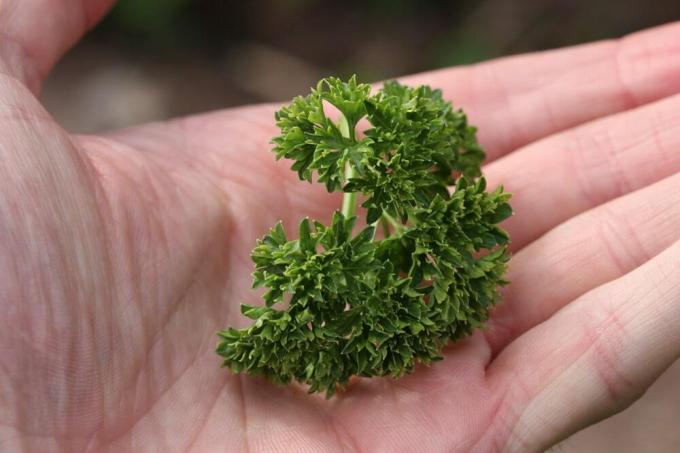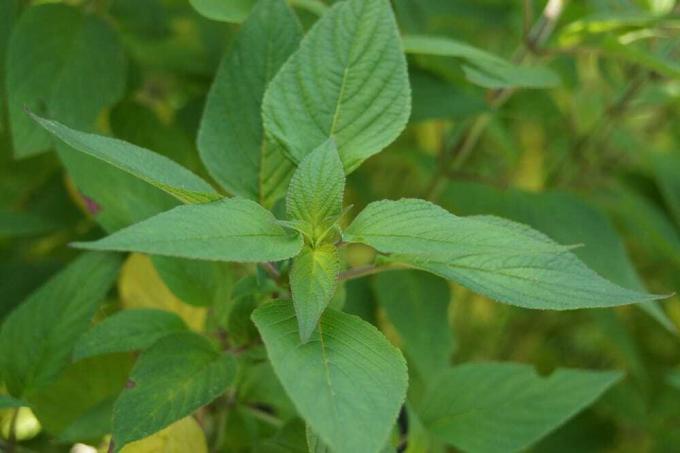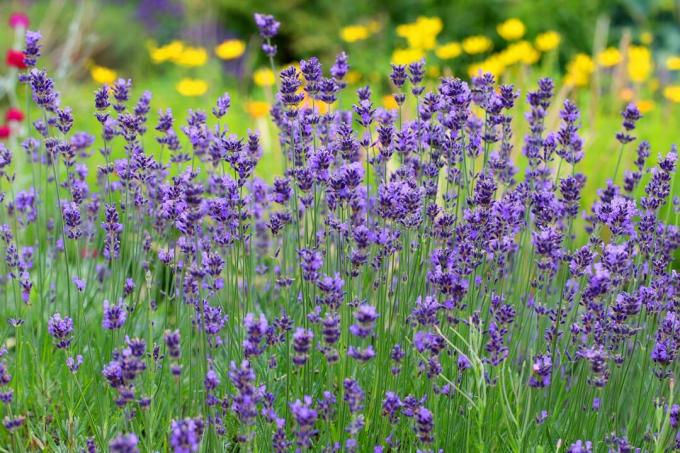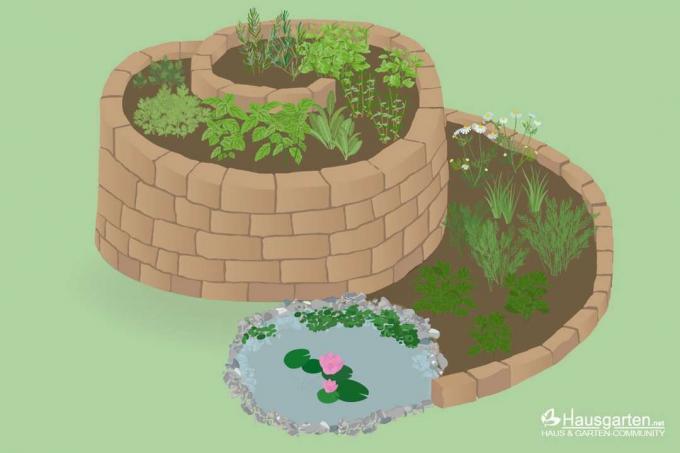

Table of contents
- Why do some herbs go together and others don't?
- Orientation and position of the balcony
- south
- west or east
- south or west balcony
- east balcony
- north
- Location on the balcony
- Annual and perennial plants
- Annual herbs:
- Perennial herbs:
- Which herbs go together?
- This doesn't match:
- planting examples
- Care
- How big does the planter have to be?
- Conclusion
Herbs can also be easily cultivated on the balcony in window boxes or large pots. In principle, annuals and perennials should not be placed in pots together. It is better to plant each category separately, as this will mean significantly less work in the fall after the growing season and will not damage the roots of perennial plants. It is also important to note which light and soil conditions the individual herbs prefer. In principle, herbs that grow very quickly and over a large area should preferably stand alone.
Why do some herbs go together and others don't?
There are many different reasons why plants hinder or promote each other. When the herbs go together, a number of benefits come into play:
- Fragrances or other excretions from one plant act as a deterrent to pests on the neighboring plant
- a type of herb attracts beneficial insects that eat the pests of the neighboring plant
- the herbs extract different nutrients from the soil (advantage of mixed cultures)
In the worst case, the plants can also hinder each other. This can have the following causes:
- growth-inhibiting substances are released via the roots of one plant
- the plants have different soil requirements or are both heavily consuming (leaching of the soil)
- some herbs grow very large and overgrow, crowding out weak-growing neighbors
Orientation and position of the balcony

Before plants are planted on the balcony, it should first be clarified exactly what lighting conditions prevail there and how the planters should be arranged.
south
Most herbs like it sunny, but need a bit of shade in the midday heat. Insofar as the sun is not blocked by trees or other houses for some time, increased maintenance is necessary. Shading can be created here on the one hand, and the hobby gardener should also be aware that he has to water a lot: in the mornings and evenings when it is very hot!
west or east
With relatively free development (neighborhood and trees), east and west balconies offer ideal conditions for herbs. Here, solar radiation occurs only in the morning or afternoon to evening hours. The ratio of shade to sun is good and evaporation is limited. A single watering per day is usually sufficient.
south or west balcony
- basil
- borage
- savory
- dill
- Chervil (with shadow)
- Lovage (with shadow)
- marjoram
- oregano
- parsley (with shade)
- rosemary
- sage
- sorrel
- peppermint
- thyme
- Lemon Balm (with shadow)
east balcony
- wild garlic
- basil
- borage
- watercress
- dill
- chervil
- lovage
- garlic mustard
- marjoram
- oregano
- Parsely
- peppermint
- sorrel
- chives
- thyme
- lemon balm
- woodruff
north
North-facing balconies have the least amount of sunshine hours. But gardeners don't have to do without herbs here either. Since the water does not evaporate so quickly here, watering should be done in the morning hours so that there is no waterlogging during the cooler hours of the night. Here the herbs should be hung up high or attached to the outside of the balcony so that they can make optimal use of the brief sunshine.
- wild garlic
- Comfrey
- watercress
- tarragon
- garlic mustard
- lemon balm
- oregano
- peppermint
- chives
- woodruff
Location on the balcony
Space-saving variants such as hanging baskets can be attached to the ceiling with a hook. Very sun-loving plants are in good hands on the outside of the balcony in a balcony box. If the balcony cladding is opaque, a place below on the ground can provide the necessary shade for more sensitive plants.
Tip:
Stepped shelves or ladder shelves also offer a lot of space in the smallest of spaces.
Annual and perennial plants

Perennial plants can overwinter on the balcony if they are covered with some straw or brushwood. Since their roots are sensitive to disturbance, no annual plants should be placed between these herbs, which may then have to be pulled out in the fall.
Annual herbs:
- basil
- savory
- borage
- dill
- Nasturtium
- chervil
- coriander
- marjoram
- Parsley (actually biennial)
- burnets
- Rosemary (hardy in warm areas)
Perennial herbs:
- wild garlic
- mugwort
- watercress
- curry herb
- fennel
- Caraway seeds
- mint
- Melissa/Lemon Balm
- sage
- chives
- cut celery
- thyme
- woodruff
Which herbs go together?
There are some herbs that complement each other well. On the other hand, unfavorable combinations are also possible, in which the plants impede each other or limit each other's growth. These should be planted in separate pots. The following combinations have proven particularly useful:
- Chamomile supports the growth of marjoram, dill, chives, burnet burnet and chervil
- Lovage promotes fennel and parsley
- Parsley can in a pot with dill and chives
- Rosemary promotes the growth of basil
- Thyme with other Mediterranean herbs such as coriander, tarragon, borage, savory
- Basil protects neighboring plants from powdery mildew and whitefly
- Lemon Balm: all other herbs except basil
This doesn't match:
- Basil with lemon balm (lemon balm)
- Dill with tarragon
- Coriander doesn't like fennel
- Do not plant peppermint with chamomile
- Marjoram unfavorable with thyme
- Wormwood prefers to be alone
planting examples

Fit together in a balcony box about 80 centimeters long:
- Strawberry Mint, Pineapple Sage, Orange Thyme, Lemon Mint
- Rosemary, Lemon Thyme, Golden Sage, Oregano, Basil
- Herb Butter and Crickets: Borage, Cascade Thyme, Lemon Balm, Chives, Dill
- Thyme, chervil, woolly thyme, basil
- Marigold, Arabic Mint, Thyme, Rosemary
- Sweet Herbs: Hyssop, Lemon Balm, Moroccan Mint, Strawberry Mint, Honeydew Melon Sage
- Italian herbs: oregano, thyme, rosemary, mint, basil
- For grilling: chives, parsley, garlic, lemon thyme, basil
- Red Basil, Crimson Sage, Moroccan Mint, Borage
- Sage, Lemon Thyme, Nasturtium, Marigold
- Marjoram, parsley, borage, chervil
- Dill, fennel, chamomile, parsley
- Basil, parsley, arugula
- Chives, lemon balm, wild garlic (partial shade)
- Thyme, sage, lemon balm, chives
- Oregano, savory, sage
- oregano, rosemary, sage, marjoram (full sun)
- Basil, savory, marjoram, rosemary
Care
Annual herbs are best sown, for perennials it is advisable to buy young plants from a nursery or garden centre. Kitchen herbs from the supermarket are bred for short-term consumption and are generally not suitable for cultivation. Good prerequisites for the cultivation of herbs on the balcony are a good supply of nutrients and water due to the limited root growth. Herbs do not require high levels of nutrients. As a rule, a single fertilization at the beginning of the growth period with long-term fertilizers such as horn shavings is sufficient.
How big does the planter have to be?
Annual herbs can be planted well in balcony boxes. The following applies to slow-growing varieties: around 15 cm of space is required per plant. The following are suitable as planters:
- rectangular balcony boxes
- plant pots
- hanging baskets
Tip:
When using zinc or mortar tubs as a planter, holes must be punched in the bottom to allow water to drain.
Large herbs are best given their own pot. More soil and space for the roots are needed here. About five liters should be enough. These include:
- Southernwood
- angelica
- lavender
- lovage
- laurel
- vermouth
- lemongrass
- peppermint
Conclusion
Except for a few herbs, which under no circumstances should be planted together in one pot, the Socialization of herbs mainly according to the light requirement, the soil conditions and the amount of irrigation water judge. Annual herbs should not be combined with perennials (care required) and strong-growing herbs should not be combined with weak ones growing together, as the fast-growing plant takes the light from its neighbors and is therefore growing handicapped.
 garden editorial
garden editorial I write about everything that interests me in my garden.
Learn more about growing herbs

Basil has black dots: what to do?
Especially basil bought in a pot from the supermarket tends to quickly develop black dots or spots on the leaves. This article explains why this is and what helps against it.

14 kitchen herbs that you can really keep in the kitchen
Sometimes a herb garden is only possible on the windowsill. If you don't have your own garden bed, for example, or in the months when the frost freezes the coveted greenery outside. Our list provides an overview of which herbs like the kitchen location permanently.

Parsley turns yellow: Four tips against yellow leaves
If the leaves of the parsley suddenly turn yellow, the so-called parsley disease is usually behind it. This can have many causes. If the outbreak of the disease is to be prevented, only prevention helps. More about this here.

You can combine lavender with these 13 plants
Whether you use it in the kitchen, want to enjoy its fragrance or its beauty, lavender is a must in any garden. Well combined, it can strengthen other plants or protect them from pests. We present the best plant neighbors.

8 tips for cutting and harvesting herbs properly
Fresh herbs from the garden should not be missing in any kitchen. They are versatile, exude pleasant and spicy scents and are a treat for the eye with their pretty flowers. In the kitchen, they can easily replace artificial flavor enhancers.

Herb spiral & herb snail: this is how it's done
A herb spiral or herb snail makes it possible to plant many different varieties in a particularly decorative way. However, this is not the only advantage of these variants of the culture. You can find out how to create them here.


